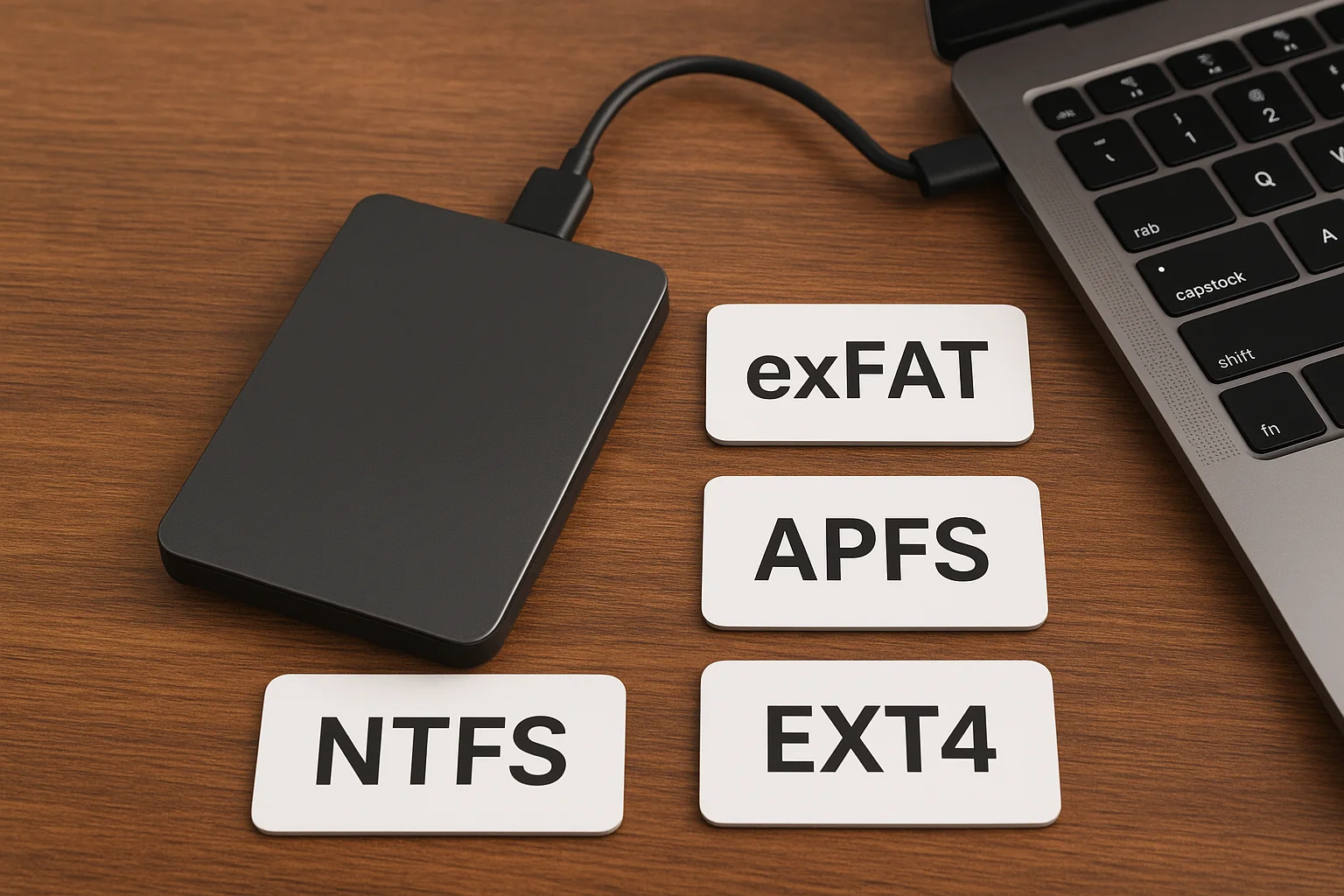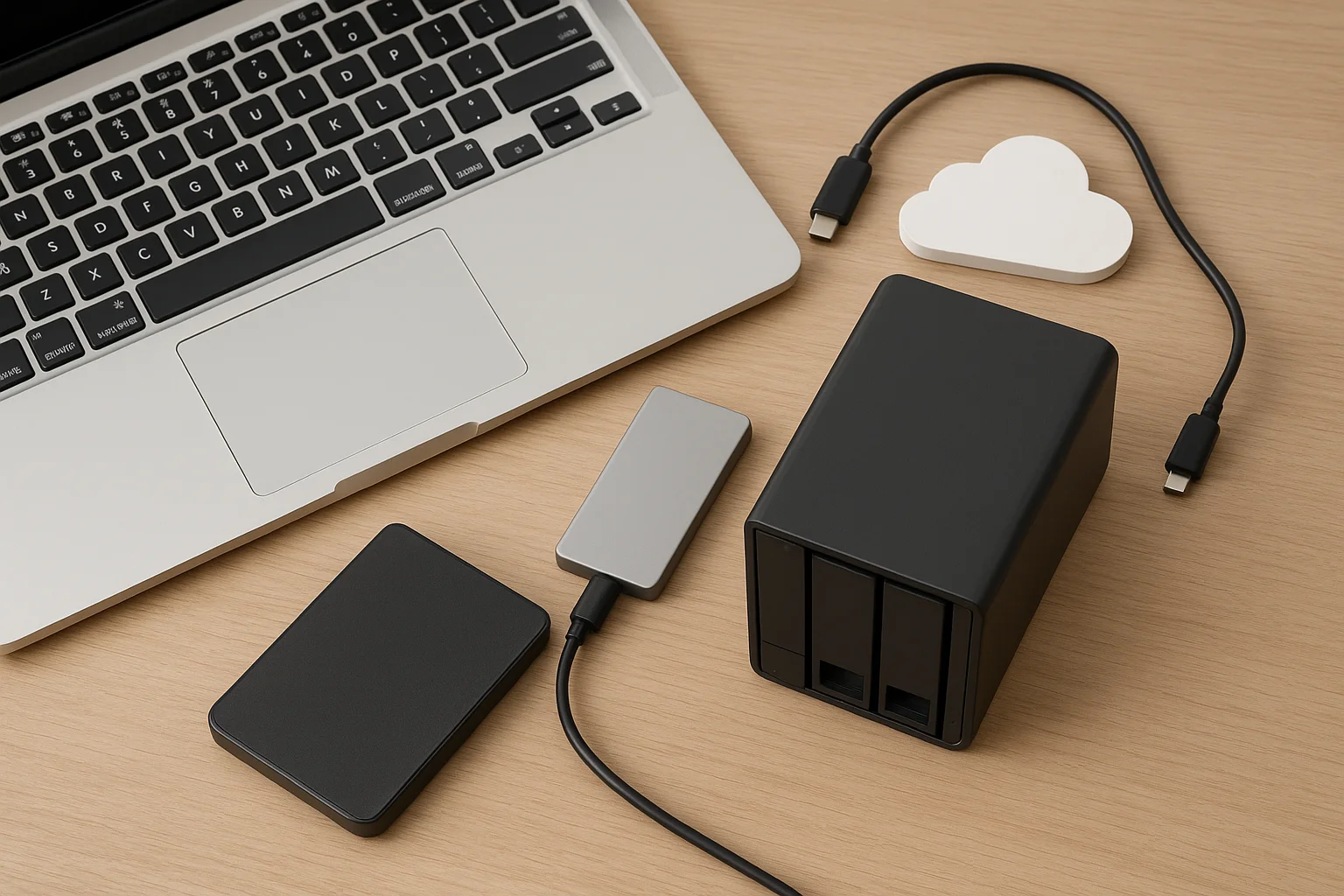Why File Systems Matter for External Drives
When it comes to external drives, the file system you choose is more than just a technical detail—it directly affects performance, compatibility, and data integrity. A file system defines how data is organized, stored, and retrieved on the drive, and different systems have different strengths and limitations.
Performance is heavily influenced by the file system. Some systems handle large files and sequential reads/writes more efficiently, while others are optimized for smaller files or frequent updates. Choosing the right system can drastically affect transfer speeds and overall responsiveness of your drive.
Compatibility is another key factor. Not all file systems are supported across every operating system. For example, NTFS works well on Windows but has limited write support on macOS, while exFAT is widely compatible but may lack some advanced features like journaling. Ensuring your drive uses a compatible file system prevents frustrating errors when moving files between devices.
Finally, file systems impact data safety and reliability. Features like journaling, checksums, and metadata handling help protect against corruption, accidental deletion, and drive failures. Selecting a file system that aligns with your use case—whether for media storage, backups, or cross-platform file sharing—can minimize the risk of data loss.
Understanding these factors allows users to make an informed choice, ensuring that the external drive performs efficiently and safely for their specific needs.
NTFS: Windows-Friendly but Limited on Other Platforms
NTFS (New Technology File System) is the default file system for modern Windows operating systems and has been optimized for stability, security, and efficient storage management. It supports large file sizes—up to 16 exabytes theoretically—and allows drives to handle partitions of massive capacity, making it ideal for modern external drives used with Windows PCs.
One of NTFS's key advantages is its robust security and permissions system. It allows users to set file-level permissions, encrypt data with built-in Windows features, and maintain access control. Additionally, NTFS supports journaling, which helps prevent data corruption in case of sudden power loss or system crashes by keeping track of changes before they are committed.
NTFS also excels at handling complex file structures. Features like hard links, symbolic links, and file compression provide flexibility for advanced users, making it a strong choice for applications such as backups, large media libraries, or professional software environments.
However, NTFS has notable cross-platform limitations. While Windows has full read/write support, macOS can only read NTFS drives by default, and Linux requires additional drivers or configuration for full write access. This means that for users who frequently move external drives between different operating systems, NTFS may cause compatibility issues or require extra software.
In summary, NTFS is a powerful and feature-rich file system for Windows users, offering high performance, advanced file management, and strong data protection, but its usefulness diminishes outside the Windows ecosystem.
exFAT: The Universal Option for Compatibility
exFAT (Extended File Allocation Table) is a file system designed to bridge the gap between NTFS and older formats like FAT32, offering cross-platform compatibility without many of the limitations of older systems. It is widely supported on Windows, macOS, and Linux, making it an ideal choice for external drives that need to move seamlessly between different operating systems.
One of exFAT’s biggest advantages is its ability to handle very large files—far beyond the 4GB limit of FAT32—while still supporting large-volume drives. This makes it perfect for storing high-definition videos, large software packages, or extensive data backups.
Lightweight and simple, exFAT avoids the overhead of more complex file systems like NTFS, which means it generally has faster write and read operations for typical external drive use cases. It does not include journaling, which reduces overhead but also means there is less built-in protection against corruption if the drive is disconnected improperly.
Another strength of exFAT is ease of use. There are no complex permissions or encryption settings to configure by default, making it suitable for users who want a plug-and-play solution for transferring files across devices without worrying about software compatibility.
While exFAT provides excellent flexibility and universality, it is less ideal for situations where data integrity and advanced file security are critical, as it lacks the robust protection mechanisms found in NTFS or APFS. Nonetheless, for most users needing a universally compatible external drive, exFAT remains the go-to choice.
APFS: Optimized for Apple Devices
APFS (Apple File System) is the modern file system developed by Apple specifically for macOS, iOS, and other Apple devices. It is designed to maximize performance, reliability, and security on Apple hardware, making it the best choice for users deeply integrated into the Apple ecosystem.
One of APFS’s key features is its optimized speed for SSDs. It uses a copy-on-write metadata strategy, which allows for faster file operations and reduces the risk of data corruption during unexpected shutdowns or power failures. This also enables instantaneous snapshots, making it easier to maintain backups and restore previous states without slowing down the system.
Space efficiency is another strength of APFS. The system supports cloning of files and directories without duplicating data physically, which saves storage space and accelerates file duplication. This is particularly valuable for users handling large media files, complex project directories, or virtual machine images.
APFS also emphasizes security and encryption. It supports native full-disk encryption as well as per-file encryption, giving users fine-grained control over data protection. Combined with Apple’s security ecosystem, APFS ensures that sensitive information on external drives remains safe from unauthorized access.
However, APFS has significant compatibility limitations. While macOS provides full support, Windows cannot natively read or write to APFS drives, and Linux support is limited to third-party drivers. Therefore, APFS is most suitable for external drives that will primarily remain within the Apple ecosystem.
In practice, APFS is ideal for macOS users who prioritize speed, advanced file management, and strong data protection, but it is less suitable for users who need extensive cross-platform compatibility.
EXT4: The Linux Powerhouse
EXT4 (Fourth Extended File System) is the most widely used file system on Linux and is known for its stability, performance, and robustness. It builds upon its predecessors (EXT2 and EXT3) by introducing features that improve large-volume handling, reduce fragmentation, and increase overall efficiency, making it a top choice for Linux users managing external drives.
One of the core strengths of EXT4 is its high performance with large files and directories. It supports volumes up to 1 exabyte and single files up to 16 terabytes, allowing users to store massive datasets or media libraries without worrying about file system limitations. EXT4 also includes extents, which allocate contiguous blocks of space for files, reducing fragmentation and improving read/write speeds.
Data integrity and reliability are central to EXT4. It supports journaling, which logs changes before they are written to the disk, protecting against data corruption in case of power failures or system crashes. Additionally, it has built-in mechanisms to detect and correct errors, providing strong protection for critical data.
EXT4 is also highly flexible. Features like backward compatibility with EXT3 and EXT2, delayed allocation, and multi-block allocation allow users to optimize performance and storage depending on their specific workload. These capabilities make EXT4 suitable for both personal external drives and enterprise-level storage solutions.
However, EXT4’s cross-platform support is limited. While Linux natively supports EXT4, Windows and macOS cannot read or write to EXT4 drives without third-party drivers or software. Users who frequently share external drives across different operating systems may face compatibility challenges.
In summary, EXT4 is a powerful, efficient, and reliable file system for Linux users, offering advanced performance features, robust data protection, and excellent handling of large volumes and files, but it is less suitable for environments requiring frequent cross-platform use.






